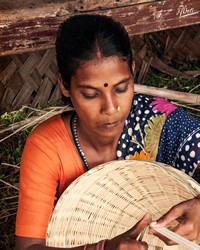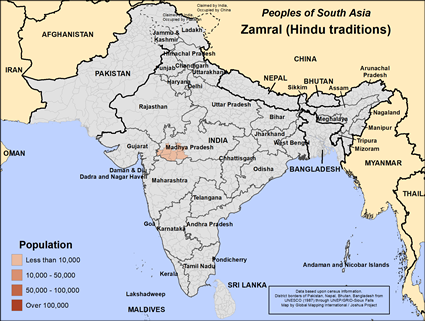Zamral (Hindu traditions) in India

Photo Source:
Copyrighted © 2026
Dr. Nagaraja Sharma - Shutterstock All rights reserved. Used with permission |

Map Source:
People Group data: Omid. Map geography: UNESCO / GMI. Map Design: Joshua Project
|
| People Name: | Zamral (Hindu traditions) |
| Country: | India |
| 10/40 Window: | Yes |
| Population: | 7,000 |
| World Population: | 7,000 |
| Primary Language: | Hindi |
| Primary Religion: | Hinduism |
| Christian Adherents: | 0.00 % |
| Evangelicals: | 0.00 % |
| Scripture: | Complete Bible |
| Ministry Resources: | Yes |
| Jesus Film: | Yes |
| Audio Recordings: | Yes |
| People Cluster: | South Asia Dalit - other |
| Affinity Bloc: | South Asian Peoples |
| Progress Level: |
|
Introduction / History
The Zamral are a relatively small group of people who make their home primarily in the central Indian state of Madhya Pradesh (known as the Heart of India). They are considered the lowest and fourth Varna, or division, in the formal Hindu caste system. The caste system divides Hindus into four main categories with the lowest communities outside of the caste system. The Zamral are not, however, part of the lowest communities but are part of the laboring caste, the Shudras. The Zamral speak Nimari or Nimadi, a language unique to their community that aligns with their cultural narratives and traditions. The Zamral also speak Hindi, the official language in this region, when communicating outside of the group.
What Are Their Lives Like?
The Zamral are farmers, craftsmen and day laborers and often have migratory jobs. They are also engaged in making baskets for market and, to a lesser extent, roofs from bamboo. The role of women is very important in the production of baskets and mats as well as in other parts of society. The Zamral marry only within their group between clans such as Basare, Chouhan and Nakalia. They eat jowar(sorghum or millet) and wheat as their primary grain and do not avoid eating meat.
What Are Their Beliefs?
The Zamral practice Hinduism, the ancient religion of India. Shankar, Parvati and Hanuman are their patron deities. They worship and serve the gods of the Hindu pantheon, mainly Brahma, Vishnu and Shiva. Hindus believe that by performing rituals and good works that they will attain "moksha" or freedom from the endless cycle of birth, death and rebirth. The Zamral visit Hindu temples and offer prayers, food flowers and incense to their gods in hopes of gaining protection and benefits. They do not have a personal or familial relationship with their gods as Christians do.
The main yearly holidays of the Zamral people are Holi, the festival of colors signifying the start of spring; Diwali, the festival of lights signifying the triumph of light over darkness; Navratri, the celebration of the start of summer and winter; and Rama Navami, a celebration of Rama's birth.
What Are Their Needs?
Outreach initiatives and programs focusing on literacy and education, healthcare, family welfare, communication, vocational training (such as electrical), economic development and government grants supporting their basket making industry can significantly benefit the Zamral community. Most of all, the Zamral need to hear the gospel message of Jesus Christ, his saving grace, and that he alone can forgive their sins and grant them eternal life.
Prayer Points
Pray for the Lord to send out workers to the Zamral people to help meet their physical, educational, vocational and spiritual needs.
Pray that the workers will find a person of peace who is receptive and willing to open the community.
Ask God to give the Zamral a spiritual hunger that will lead them to embrace Christ no matter what the cost.
Pray for a Disciple Making Movement that will bless the Zamral people.